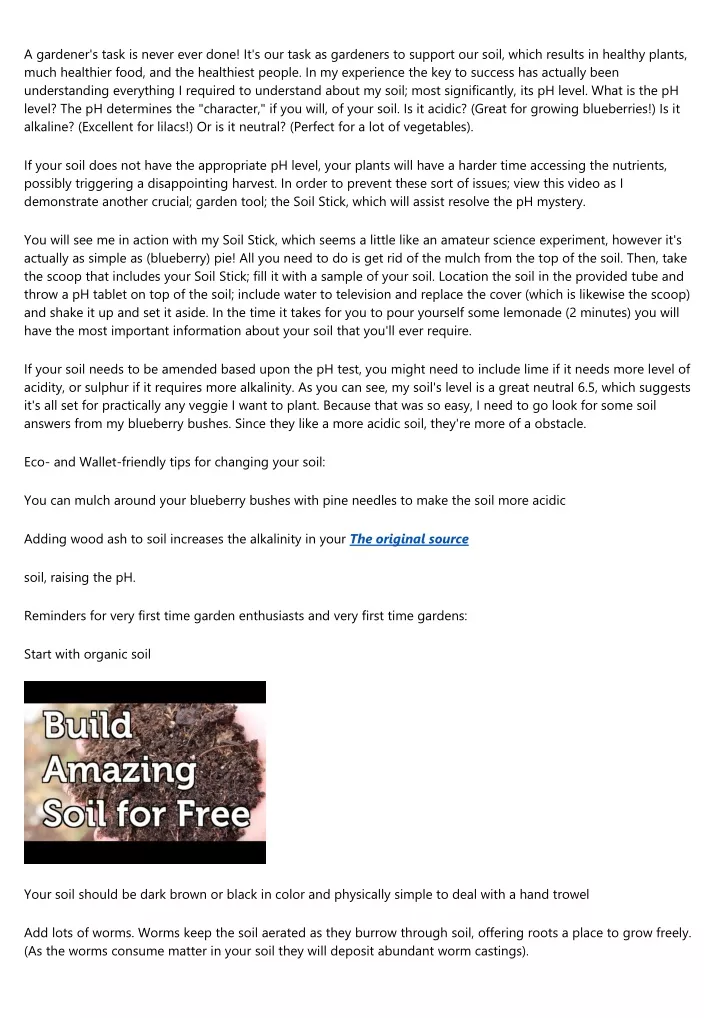
20 likes | 27 Vues
Those brand-new to organic gardening in some cases believe that growing one's own veggies is all that is required to be an organic gardener. This guide will offer you the understanding and abilities needed to grow a true organic veggie Plants need more energy, care, and time to control bugs and diseases than they anticipated. To attend to these problems, house owners utilize chemical treatments and pesticides that endanger human health and wellness, and produce an environment that makes plants depending on routine and expensive home upkeep contracts. Due to the fact that the roots are unable to soak up the nutrients they need, plant health suffers. garden!

E N D
A gardener's task is never ever done! It's our task as gardeners to support our soil, which results in healthy plants, much healthier food, and the healthiest people. In my experience the key to success has actually been understanding everything I required to understand about my soil; most significantly, its pH level. What is the pH level? The pH determines the "character," if you will, of your soil. Is it acidic? (Great for growing blueberries!) Is it alkaline? (Excellent for lilacs!) Or is it neutral? (Perfect for a lot of vegetables). If your soil does not have the appropriate pH level, your plants will have a harder time accessing the nutrients, possibly triggering a disappointing harvest. In order to prevent these sort of issues; view this video as I demonstrate another crucial; garden tool; the Soil Stick, which will assist resolve the pH mystery. You will see me in action with my Soil Stick, which seems a little like an amateur science experiment, however it's actually as simple as (blueberry) pie! All you need to do is get rid of the mulch from the top of the soil. Then, take the scoop that includes your Soil Stick; fill it with a sample of your soil. Location the soil in the provided tube and throw a pH tablet on top of the soil; include water to television and replace the cover (which is likewise the scoop) and shake it up and set it aside. In the time it takes for you to pour yourself some lemonade (2 minutes) you will have the most important information about your soil that you'll ever require. If your soil needs to be amended based upon the pH test, you might need to include lime if it needs more level of acidity, or sulphur if it requires more alkalinity. As you can see, my soil's level is a great neutral 6.5, which suggests it's all set for practically any veggie I want to plant. Because that was so easy, I need to go look for some soil answers from my blueberry bushes. Since they like a more acidic soil, they're more of a obstacle. Eco- and Wallet-friendly tips for changing your soil: You can mulch around your blueberry bushes with pine needles to make the soil more acidic Adding wood ash to soil increases the alkalinity in your The original source soil, raising the pH. Reminders for very first time garden enthusiasts and very first time gardens: Start with organic soil Your soil should be dark brown or black in color and physically simple to deal with a hand trowel Add lots of worms. Worms keep the soil aerated as they burrow through soil, offering roots a place to grow freely. (As the worms consume matter in your soil they will deposit abundant worm castings).
Do not utilize petro chemical fertilizer; it can damage the whole ecosystem. Do make compost. In my experience the key to success has actually been understanding everything I needed to understand about my soil; most importantly, its pH level. Take the scoop that comes with your Soil Stick; fill it with a sample of your soil. Location the soil in the supplied tube and throw a pH tablet on top of the soil; add water to the tube and replace the cover (which is also the scoop) and shake it up and set it aside. If your soil needs to be changed based on the pH test, you may need to add lime if it needs more acidity, or sulphur if it requires more alkalinity. Worms keep the soil aerated as they burrow through soil, giving roots a place to grow freely.
